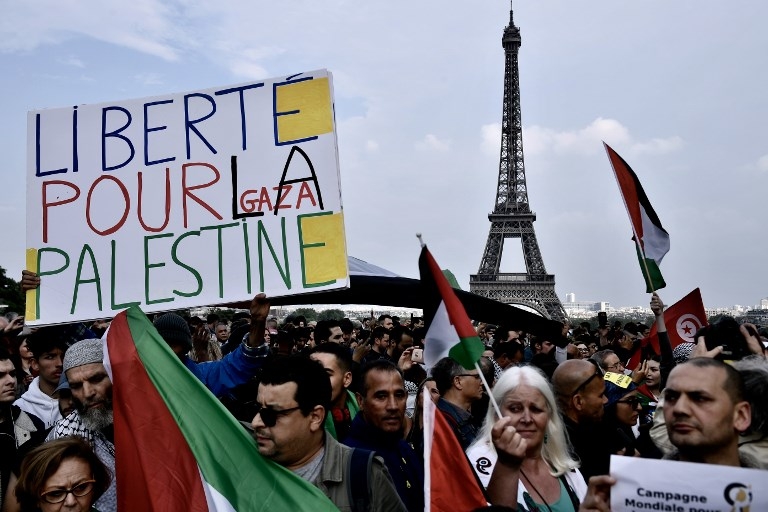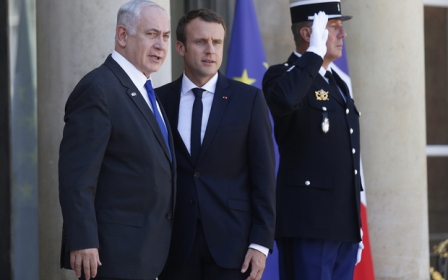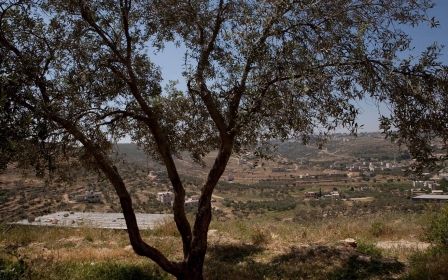When it comes to Palestine, France can't shake off its colonial past

On 10 October, the Israeli ambassador to Paris, Aliza Bin Noun, requested that France Television censor a documentary entitled Gaza: A Crippled Youth, covering the stories of young Palestinian demonstrators mutilated by Israeli snipers along the Gaza fence since the Great March of Return began six months ago.
The documentary follows the life of Alaa, 21, who had trained to become Palestine’s first cycling champion - a dream that was shattered on 30 March, when an Israeli bullet took his right leg. Another young man, 13-year-old Mohamad, wanted to become a doctor, but was also wounded in the demonstrations and underwent an amputation. Dozens more have been crippled by Israeli soldiers since the protests erupted in March.
One of these soldiers is French-Israeli Michael Oiknine, who proudly tweeted that he killed two Palestinian protesters at the Gaza fence. His statement incited a storm of controversy, with many denouncing his acts of terrorism against an unprotected and besieged civil population. Oiknine later retracted his claim of killing protesters and issued an apology.
Committing war crimes
Although French police and intelligence services were alerted to this public confession of murder, Oiknine had nothing to fear; no French officer would knock on his door to investigate.
There is precedent for French citizens committing war crimes on occupied Palestinian land. In March 2016, French-Israeli soldier Elor Azaria fatally shot an injured Palestinian, an extrajudicial execution that amounted to a crime under international law, according to Amnesty International. After an international outcry, Azaria spent nine months in prison.
The French government did not issue a statement on Azaria’s dual nationality, nor was there any national debate over the termination of nationality after a war crime, as is the norm when French citizens commit crimes in Syria or Iraq. Will Azaria ever be called in by French intelligence services for an interrogation upon returning home, or have his name added to the interior ministry’s database?
The interior ministry offers a clear definition of who’s to be considered a radicalised element. Certain changes in behaviour, such as a sudden rupture with family members, asocial tendencies or a shift in cultural identity are among the criteria.
Lone soldiers
These characteristics fit with the pattern of the “lone soldiers” programme, designed by the Israeli army to recruit foreigners or new immigrants who do not have family in the country. Around 7,000 lone soldiers are currently serving in Israel, including many French dual nationals, athough there are no exact figures as to how many.
Active recruitment of these soldiers takes place in the French capital. A few years ago, the Israeli embassy in Paris invited the local Jewish community to attend a recruitment session with an army representative. This past August, the Israeli army welcomed 300 new lone soldiers, including seven from France.
Many of the victims were children who knew nothing but colonisation, war and misery; were always yearning for a better life, a better future, one with dignity. It was Israel, backed by France, that robbed them of this
France is viewed as an important source of settlers for Israel, comprising the largest Jewish community in Europe and the third-largest in the world, after Israel and the US. According to Israel’s Central Bureau of Statistics, thousands of French settlers have arrived in the country in recent years; today, there are more than 21,000 French settlers violating international law on Palestinian land.
Israel has worked hard to conflate anti-Zionism with anti-Semitism and colonisation with migration. While migration has always been part of human nature - triggered by different social, financial or political reasons - colonisation is a movement based on privilege, thriving on the exploitation of the native population’s land and resources. Indeed, French settlers have contributed to the eradication of Palestinian lives, yet they have never once been condemned by the French government.
Murderous colonial history
Could it be that France wouldn’t recognise a colonisation project, even if it was right before its eyes? Given its own dark and murderous colonial history throughout the world, France may have a blind spot in this regard.
Over the past six months, scores of Palestinians in Gaza have been killed by Israeli forces for demanding their rights to return home to their villages, located just a few kilometres from the Israeli fence that imprisons them.
Many of the victims were children who knew nothing but colonisation, war and misery; were always yearning for a better life, a better future, one with dignity. It was Israel, backed by France, that robbed them of this.
- Hanine Hassan is a teaching fellow of the Middle Eastern, South Asian and African Studies (MESAAS) department at Columbia University. She is on Twitter @hanine09.
The views expressed in this article belong to the author and do not necessarily reflect the editorial policy of Middle East Eye.
Photo: People hold up Palestinian flags and a placard reading ‘Liberty for Palestine’ at a rally in Paris on 16 May 2018 (AFP)
This article is available in French on Middle East Eye French edition.
New MEE newsletter: Jerusalem Dispatch
Sign up to get the latest insights and analysis on Israel-Palestine, alongside Turkey Unpacked and other MEE newsletters
Middle East Eye delivers independent and unrivalled coverage and analysis of the Middle East, North Africa and beyond. To learn more about republishing this content and the associated fees, please fill out this form. More about MEE can be found here.






